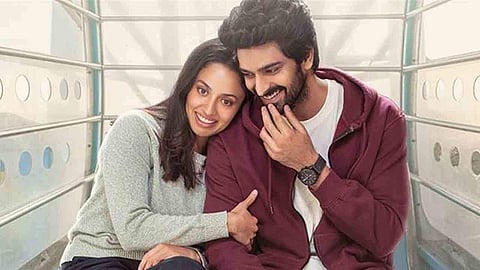Phalana Abbayi Phalana Ammayi Movie Review: A middling romance that wears its indieness on its sleeve
Rating:(3 / 5)
During a scene from Phalana Abbayi Phalana Ammayi (PAPA), that we get right after its protagonists Sanjay (Naga Shaurya) and Anupama (Malavika Nair) start living together in the UK, we see them pose goofily in front of a mirror, like actors on magazine covers, while mouthing some cliche cover quotes. Stuff like, “I will work even after marriage” and “We are just friends”. Here are two normal people pretending to be stars, when it is a given that most cinema we watch is about stars pretending to be normal people.
Director - Srinivas Avasarala
Cast - Naga Shaurya, Malavika Nair, Abhishek Maharshi, Srividya, Srinivas Avasarala
While pretension and suspension of disbelief are the foundations for most of our films, PAPA brings French New Wave sensibilities, with its stubborn insistence on showing life as one sees and feels it. While realism is a go-to modus operandi for say, a documentary or a hard-hitting social drama — to shoot a pure romance in that format is both audacious and instantly polarizing.
Though the title of the film translates to some boy and some girl, the film is also a lot about the world around them. It is a world clearly crafted from the writer Srinivas Avasarala’s memories and lived reality and it is no coincidence that Srinivas is in his early 40s now, the same age his Sanjay and Anupama would be, considering they were 18 in 2000 and 28 in 2010.
PAPA is about two people who spend a decade as each others’ friends, partners and exes, but it is also a story about being an NRI, where lives are characterized by thesis submissions and live-in relationships. It is a world where everybody is always driving somewhere and folks have cute dates atop a high-rise while holding glasses of red wine. It is a world where the small moments of intimacy between the film’s leads are filmed with the same love and tenderness as the shots involving swans on a lake or the wedding of the leads' friends.
There is a Jaane Tu Ya Jaane Na (2008) vibe that permeates the earlier parts of Sanjay’s and Anupama’s relationship, with The Notebook (2004)-like premise bookending the film, where one character goes to another character’s residence to demand closure. I was also pleasantly reminded of One Day (2011), a film that is also majorly set in the UK.
PAPA beautifully incorporates some beloved songs into its narrative, from Nuvve Kavali (2000)’s Anaganaga Aakasam Undhi to the title song of Padamati Sandhya Ragam (1987) and Madana Kamaraju Katha (1963)’s Neeli Megha Malavo. The film’s own soundtrack by Kalyani Malik is both pleasing and poignant.
PAPA indie-isms, however, which involve choices like using jump cuts to show a girl walking towards her apartment and the use of sync sound has worked against the film, at least its viewing experience. The Phalana in the title could mean two things, it could refer to a specific person and it could also refer to anybody, in a way that suggests ubiquitousness. While the part involving why Sanjay never says the words ‘I love you’ again matches both the specificity and ubiquitousness the title refers to, shining a light on how and why countless men grow up to be emotionally unavailable. Anupama’s character, in comparison, could have benefitted from deeper characterisation. Ironically enough, Malavika’s performance was more effective than that of Naga Shaurya.
The film’s improvised lines are a stark departure from the typical Telugu dialogues which wholly rely on punchlines, rhyming insults and wordplay. I believe it is bound to create a disconnect with most of the audience for this novelty, and also the fact that the dialogues are continuously cut short to establish a certain style won't go well with everyone. PAPA’s lack of dramatic conflict, which is further amplified by scenes being condensed and cut abruptly, also induces fatigue and boredom in the audience.
Two of my favourite smaller roles in PAPA, Valentine’s cousin Neelima and Pooja’s older brother, secure the maximum laughs in the theatre for their combination of realistic observations and cinema-friendly comedic delivery. These two characters, in a film filled with first-world problems, were written with a delightful blend of indie and mainstream cinema. It only made me woefully hope that the rest of the film packed the same concocted energy around these two individuals.


